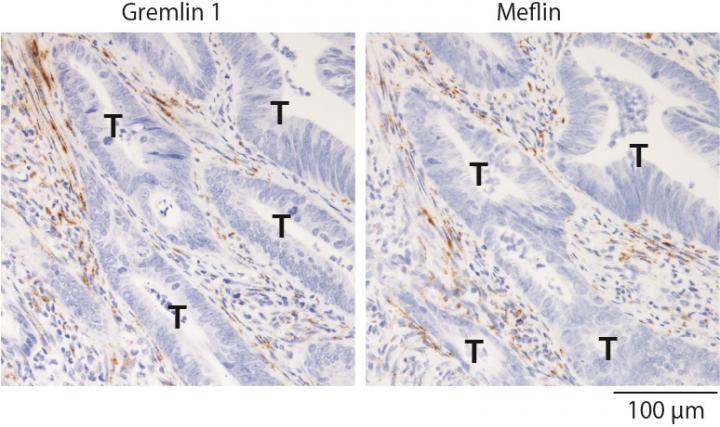
Credit: Atsushi Enomoto
Nagoya University researchers and colleagues have revealed that colorectal cancer tissues contain at least two types of fibroblasts (a type of cells found in connective tissue), namely, cancer-promoting fibroblasts and cancer-restraining fibroblasts, and that the balance between them is largely involved in the progression of colorectal cancer. Their findings, recently published in the journal Gastroenterology, suggest that artificially altering the balance between the two types of cells could curb the spread of colorectal cancer tumors, which may become an effective strategy for preventing cancer progression.
Cancer tissues comprise both cancer cells and non-malignant cells such as fibroblasts. Previous studies have suggested that the proliferation of fibroblasts is largely involved in the progression of colorectal cancer, the most common cancer in Japan. Fibroblasts within cancer tissues, called cancer-associated fibroblasts (CAFs), are considered to be divided into at least two populations: those that promote cancer progression and those that restrain it. Impeding the function of cancer-promoting CAFs could be a promising method to prevent cancer progression, but a lack of understanding of the mechanism underlying heterogeneity of CAFs has hampered its development.
In normal colon tissues, proteins called bone morphogenetic proteins (BMPs), which are secreted by stromal cells, are known to play a critical role in regulating intestinal homeostasis, whereas in cancerous colon tissues, they are considered to be associated with cancer progression. In this context, the research team led by Professors Atsushi Enomoto and Masahide Takahashi of the Graduate School of Medicine at Nagoya University in Japan conducted a study to determine how stroma cells lead BMPs to be involved in the progression of colorectal cancer.
The team first analyzed comprehensive gene expression profiling data to identify BMP-related genes that are specifically expressed in colorectal CAFs. Two types of proteins, meflin and gremlin 1, were identified to be encoded by such genes. Next, to investigate the relevance of these proteins in colorectal cancer progression, Prof. Enomoto and his colleagues, who had previously shown that meflin plays a role in restraining the progression of pancreatic cancer, conducted a study in collaboration with researchers from the University of Adelaide and the South Australian Health and Medical Research Institute, who have conducted studies focusing on the role of gremlin 1 as a BMP inhibitor in the intestine.
The joint research group examined the prognostic significance of the expression of meflin and gremlin 1 in colorectal cancer patients and found that, interestingly, those with a high expression of meflin have a favorable prognosis, whereas those with a high expression of gremlin 1 have an unfavorable prognosis. In addition, experiments using a mouse model revealed that the proliferation of colorectal cancer cells can be suppressed through administration of a gremlin 1-neutralizing antibody or overexpression of meflin.
Regarding the role of BMP signaling mediated by stromal gremlin 1 and meflin in colorectal cancer, Prof. Enomoto explains, “We hypothesize that CAFs mediated by gremlin 1 promote cancer progression by decreasing BMP signaling, whereas CAFs mediated by meflin restrain the growth of the cancer by reinforcing BMP signaling.” Therefore, intensifying stromal BMP signaling, either by using a gremlin 1-neutralizing antibody or by overexpressing meflin, could be an attractive therapeutic strategy to treat colorectal cancer.
###
The study, “The balance of stromal BMP signaling mediated by GREM1 and ISLR drives colorectal carcinogenesis,” was published online in the journal Gastroenterology on November 14, 2020 at DOI 10.1053/j.gastro.2020.11.011.
About Nagoya University, Japan
Nagoya University has a history of about 150 years, with its roots in a temporary medical school and hospital established in 1871, and was formally instituted as the last Imperial University of Japan in 1939. Although modest in size compared to the largest universities in Japan, Nagoya University has been pursuing excellence since its founding. Six of the 18 Japanese Nobel Prize-winners since 2000 did all or part of their Nobel Prize-winning work at Nagoya University: four in Physics – Toshihide Maskawa and Makoto Kobayashi in 2008, and Isamu Akasaki and Hiroshi Amano in 2014; and two in Chemistry – Ryoji Noyori in 2001 and Osamu Shimomura in 2008. In mathematics, Shigefumi Mori did his Fields Medal-winning work at the University. A number of other important discoveries have also been made at the University, including the Okazaki DNA Fragments by Reiji and Tsuneko Okazaki in the 1960s; and depletion forces by Sho Asakura and Fumio Oosawa in 1954.
Website: http://en.
Media Contact
Atsushi Enomoto
[email protected]
Original Source
http://en.
Related Journal Article
http://dx.




